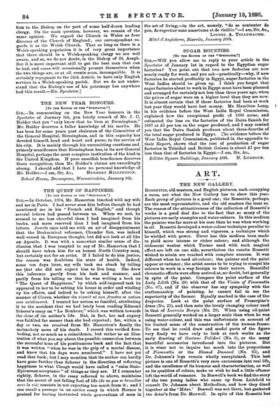THE QUEST OF HAPPINESS.
[To THE EDITOR OF THE " SPECTATOR.".] SIR,—In October, 1894, Mr. Hamerton lunched with my wife and me in Paris. I had never seen him before, though he had mentioned me in his "French and English," and though several letters had passed between us. When we met, he seemed to me less cheerful than I had imagined from his books, and more reserved than I had imagined from his letters. Jowett once told me with an air of disappointment that the Brahminical reformer, Chunder Sen, was indeed well versed in European thought, but did not look at all like an Apostle. It was with a somewhat similar sense of dis- illusion that I was tempted to say of Mr. Hamerton that I should have taken him for an honest North Country man, but certainly not for an artist. If I failed to do him justice, the reason was doubtless his state of health. Indeed, some ten days later, my wife took me aback by telling me that she did not expect him to live long. She drew this inference partly from his look and manner, and partly from his telling us that he was writing a book on " The Quest of Happiness," by which self-imposed task he appeared to her to be setting his house in order and winding up his affairs, and indeed to be asking himself, after the manner of Cicero, whether ita vizerit ut non frustra se natum esse existimaret. I treated her notion as fanciful, attributing it to the accident that we had lately been reading Edmond Scherer's essay on "Le Bonheur," which was written towards the close of its author's life. But, in fact, her sad augury was fulfilled far sooner than she had expected; for, within a day or two, we received from Mr. Hamerton's family the melancholy news of his death. I record this verified fore- boding, not so much as a coincidence, but rather as an illus- tration of what you say about the possible connection between the mournful tone of his posthumous book and the fact that it was written "when he was in the grip of a mortal disease, and knew that his days were numbered." I have not yet read that book ; but I may mention that its author can hardly have gone further than Scherer in the direction of referring happiness to what Clough would have called a "calm Stoic- Epicurean acceptance" of things as they are. If I remember rightly, Scherer, in the essay referred to above, maintains that the secret of not falling foul of life (de ne pas se brouiller avec la vie) consists in not expecting too much from it ; and I can recall a passage in an earlier essay in which Horace is praised for having instructed whole generations of men in
the art of living,—in the art, namely, "de se contenter de pen, de regretter sans amertume et de vieillir."—I am, Sir, &c.,
LIONEL A. TOLLEMACHE.
H6tel d'Angleterre, Biarritz, January 10th.


































 Previous page
Previous page